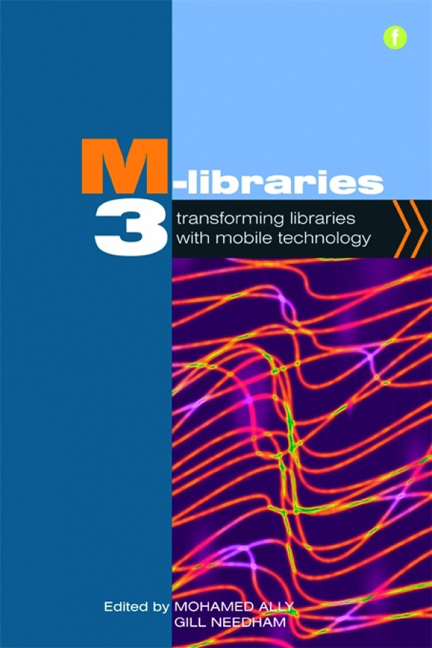Book contents
- Frontmatter
- Contents
- Acknowledgements
- Contributors
- Foreword
- Introduction
- 1 Education for all with mobile technology: the role of libraries
- PART 1 DEVELOPING MOBILE SERVICES
- PART 2 PEOPLE AND SKILLS
- 9 Staff preparedness to implement mobile technologies in libraries
- 10 Apps and attitudes: towards an understanding of the m-librarian's professional make-up
- 11 There's a librarian in my pocket: mobile information literacy at UTS Library
- 12 Exploring student engagement with mobile technologies
- 13 It's just not the same: mobile information literacy
- 14 The students have iPods: an opportunity to use iPods as a teaching tool in the library
- PART 3 FOCUS ON TECHNOLOGY
- Conclusion
- Index
9 - Staff preparedness to implement mobile technologies in libraries
from PART 2 - PEOPLE AND SKILLS
Published online by Cambridge University Press: 08 June 2018
- Frontmatter
- Contents
- Acknowledgements
- Contributors
- Foreword
- Introduction
- 1 Education for all with mobile technology: the role of libraries
- PART 1 DEVELOPING MOBILE SERVICES
- PART 2 PEOPLE AND SKILLS
- 9 Staff preparedness to implement mobile technologies in libraries
- 10 Apps and attitudes: towards an understanding of the m-librarian's professional make-up
- 11 There's a librarian in my pocket: mobile information literacy at UTS Library
- 12 Exploring student engagement with mobile technologies
- 13 It's just not the same: mobile information literacy
- 14 The students have iPods: an opportunity to use iPods as a teaching tool in the library
- PART 3 FOCUS ON TECHNOLOGY
- Conclusion
- Index
Summary
Introduction
Mobile technologies have added a new dimension to the role of library staff, a role that requires relevant knowledge and skills to ensure that the needs and expectations of clients are met (Gentry, 2011; Kroski, 2008; Traxler, 2008). For libraries to succeed in the mobile environment, management will have to consider two significant staffing issues. Firstly, it needs to understand the knowledge and skills required by staff to enable them to deliver services through mobile technologies; secondly, that understanding should be applied to develop support and training for staff in the use of mobile technologies. In order to explore these issues a survey was undertaken in late 2010, involving librarians working in the vocational education and training (VET – similar to further education in the UK) sector in Australia and New Zealand.
Vocational education and training libraries and mobile technologies
Generally, research into mobile technologies across the library sector in tertiary education has focused on universities (Adams, 2009; Kealy, 2009; Zauha and Potter, 2009). While there are similarities between university libraries and VET libraries, the differences are notable. There are 58 VET institutions in Australia and 19 institutes of technology and polytechnics (ITPs) in New Zealand. In 2008 enrolments numbered 1.7 million for Australia and 78,000 in New Zealand (Commonwealth of Australia, 2009; New Zealand Ministry of Education, 2009). These are large and diverse groups, comprising students taking apprenticeships, certificate, diploma and degree-level courses. The sector is characterized by a focus on industry and community engagement, whereby students tend to be competency based rather than research oriented and many have ongoing workplace commitments related to their studies. Prolonged periods of absence from campus and the young average age of the student cohort mean that effective mobile library services are particularly critical for the VET sector (Douch et al., 2010).
About the study
Library staff from eight New Zealand and six Australian VET institutions were invited to participate in a survey that included a short online questionnaire and an interview (conducted in person, over the telephone or via Skype). The questionnaire gathered some demographic information and asked participants to indicate their competence in using mobile technologies. The interviews used open questions to discuss the knowledge and skills required to deliver mobile services and the on-the-job training required to acquire those knowledge and skills.
- Type
- Chapter
- Information
- M-Libraries 3Transforming libraries with mobile technology, pp. 75 - 84Publisher: FacetPrint publication year: 2012



